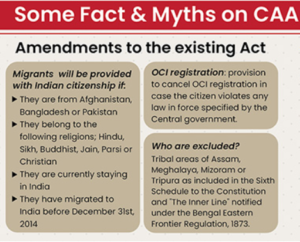More information on the issue-
- January 9 was the last day of an extension sought from the two parliamentary committees in the Lok Sabha and the Rajya Sabha to frame the rules.
- It is to be noted that without rules, the Act cannot be implemented, which means the persons covered under the CAA may apply for citizenship after the rules are notified under the CAA.
- Earlier, it had sought time till April 9, 2021 and then July 9, 2021 from the committees to notify the rules which are to be published in the Gazette of India.
- As per the Manual on Parliamentary Work, in case the ministries/departments are not able to frame the rules within the prescribed period of six months after legislation is passed, “they should seek extension of time from the Committee on Subordinate Legislation stating reasons for such extension” which cannot be more than for a period of three months at a time.
Important provisions of Citizenship (Amendment) Act (CAA), 2019-
- It aims to grant quicker paths to citizenship to those refugees who have faced religious persecution in neighboring countries.
- It amended Citizenship Act 1955 which provides various ways in which citizenship may be acquired.
- It was passed by Parliament on December 11, 2019 and the Act was notified within 24 hours on December 12.

- The CAA provides citizenship on the basis of religion to six undocumented non-Muslim communities from Pakistan, Afghanistan and Bangladesh who entered India on or before December 31, 2014.
- It exempts the members of the six communities from any criminal case under the Foreigners Act, 1946 and the Passport Act, 1920. (( The two Acts specify punishment for entering the country illegally and staying here on expired visas and permits)).
- It also relaxed the residence requirement for naturalization of these migrants from twelve years to six.
Extra reading- https://journalsofindia.com/citizenship-amendment-bill-cab/
















